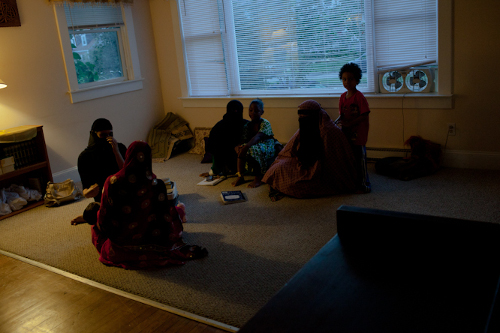
Image source: 30Mosques

By: Rahila Bano
Source: http://www.bbc.co.uk/
An Islamic charity is to open a third hostel to cope with the demand of homeless Muslim women.
The National Zakat Foundation (NZF) already has two refuges, in London and Birmingham.
The charity said that since the hostels opened a year ago, almost 100 Muslim women have contacted them, most of them victims of abuse.
Fifty four women have been given places and NZF has now secured funding for a third hostel in Greater Manchester.
It is expected to open in the next couple of months.
‘Helped me escape’
The charity said many of the women who had contacted it – ranging in age from 18 to 72 – were victims of mental and physical abuse, domestic violence, sexual abuse and forced marriages.
One 19-year-old Bangladeshi teenager from the north west, who does not want to reveal her identity for fear of reprisals from her family, said: “My mum and sister would beat me up and would falsely accuse me of jumping into men’s cars.
“One day, I heard my mum and my uncle talking on the phone about my marriage to a relative in Bangladesh. I could not believe they had gone behind my back, so I decided to leave before it was too late.
“These sort of things can end up in honour killings.”
Sarah, a Pakistani woman in her 20s, from Staffordshire, who contacted NZF, said she had also suffered violence. She said she had arrived in the UK two years ago and found she was treated like a domestic slave.
“My in-laws would hit me if they did not like the food. My husband did not love me, he said he did not even like me. I had to call the police and they helped me to escape,” she said.
Although, the NZF homes are funded by the Muslim community, the charity has worked with the national social housing organization, Trident Reach The People, and Women’s Aid, to find suitable locations.
‘Exceeded expectations’
Trident, a Midlands-based charity which runs two refuge hostels in Birmingham and Derbyshire, said it had also seen “high” demand for accommodation from Muslim women in recent years, particularly in the Birmingham area.
The manager of the Birmingham hostel said: “If we were to look back roughly 10 years ago, a lot of Muslim women used to be afraid to speak openly about suffering domestic abuse as most women were unaware of the support services that were available to them, and also culture based issues prevented them from accessing services.
“But there has been a turn around since then, more Muslim women are coming forward and reporting abuse to the police.”
Parveen Javaid, a domestic violence officer who works at the Pakistani Resource Centre in Manchester, said she had also noticed an “influx” in the number of women from Pakistan and Bangladesh who were looking for support in the last year.
“I think they are now aware of the help that is available to them,” she said.
Iqbal Nasim, manager for NZF, said: “When we went into the project we didn’t know exactly how many women would be referred into the service, but it is certainly the case that the level of demand has exceeded our expectations.
“The main difference between the new hostels and the ones that already exist, is that they also cater for the religious, spiritual and cultural needs of women who are often left traumatized by their experience.”
‘One big family’
There are Islamic texts on the walls of the lounge, copies of the Koran are available on the bookshelf and halal meals are also provided.
There are also no male staff and no alcohol is allowed on the site.
Some of the women have previously stayed at other hostels and one Bangladeshi teenager said she found the experience “uncomfortable” on religious grounds.
Salma, 27, said: “I feel safe here, I can practice my religion freely with the other women. We pray together and read the Koran. Sometimes there are also discussions about what the holy book says and it gives me inner peace.”
Another resident, Simi, is an asylum seeker from Somalia. She fled her home after her family discovered she was a lesbian.
She said: “I like it here because we are just like one big family, all the other women are Muslim, we fast together during the month of Ramadan, it gives me a sense of community.”



